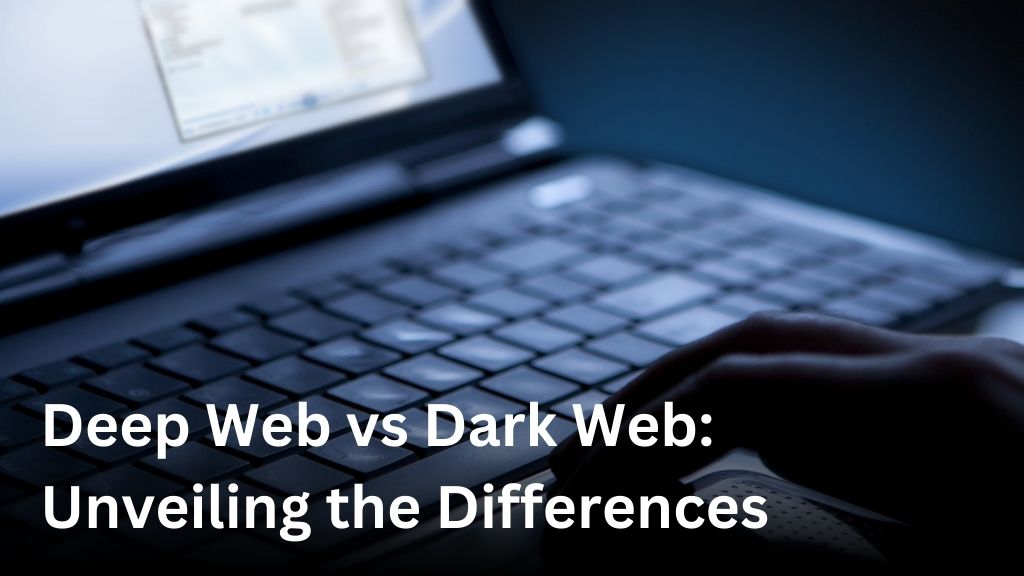Welcome to our comprehensive guide on the deep web and the dark web. In this article, we will dive deep into the comparisons and distinctions between these two intriguing aspects of the internet. By understanding the difference between the deep web and the dark web, you will gain valuable insights into their unique functions and how they impact online privacy. The deep web, often confused with the dark web, encompasses all the web pages that search engines cannot index. These hidden pages make up a significant portion of the internet, where sensitive information like medical records, classified documents, and academic research resides. On the other hand, the dark web refers to a portion of the deep web that requires specific software or authentication to access. So, what sets the deep web apart from the dark web? The answer lies in their accessibility and the nature of the content they host. While the deep web is comprised of legitimate and legal content that may be inaccessible through traditional search engines, the dark web is known for harboring illicit activities, such as illegal marketplaces, hacking forums, and other nefarious endeavors. Throughout this article, we will explore the nuances of the deep web and the dark web, equipping you with knowledge to differentiate between the two. Whether you’re a curious internet user or a professional seeking to understand the implications of these hidden realms, this guide will provide you with valuable insights. Join us as we embark on this journey to demystify the deep web and the dark web and discover their impact on online privacy. By the end, you’ll be equipped with the necessary information to navigate the complexities of the internet and protect your personal information. Understanding the Deep Web When it comes to the vast and hidden corners of the internet, the deep web plays a crucial role. Unlike the surface web, which is accessible through search engines, the deep web remains hidden from conventional browsing methods. It encompasses content and data that are not indexed or easily accessible via search engines. To gain a better understanding of the deep web, let’s explore its relationship with the surface web and the dark web. The surface web, also known as the visible web, consists of websites that can be accessed through search engines like Google and Bing. These sites are indexed and ranked based on their relevance to search queries. The surface web typically includes public websites, news articles, blogs, and other freely accessible content. In contrast, the deep web represents the vast majority of internet content that remains unindexed by search engines. It includes protected resources, private databases, academic journals, corporate intranets, and more. While the deep web is not inherently nefarious, its hidden nature makes it a breeding ground for illicit activities. It is important to note that not all activity within the deep web is illegal, as it also serves legitimate purposes such as secure communication, file sharing, and anonymous browsing. To provide a visual representation of the deep web’s scope, here is an informative infographic comparing the surface web, deep web, and dark web: Surface Web Deep Web Dark Web Accessible with search engines Not indexed by search engines Requires special software to access Publicly available content Protected resources and private databases Hidden and anonymous Legal and legitimate activities A mix of legal and illegal activities Hosts illegal activities, black markets Demystifying the Dark Web As we continue our exploration of the hidden corners of the internet, it’s time to shed some light on the mysterious reputation of the dark web. Contrary to popular belief, accessing the dark web is not as complicated as it may seem. Although it requires specialized software and can be risky, anyone curious enough can gain entry with a few simple steps. Before we delve into the methods of accessing the dark web, let’s first distinguish it from the deep web. While the deep web refers to the vast expanse of the internet that is not indexed by search engines, the dark web is a small subset of the deep web that requires specific software, such as the Tor browser, to access. There are several ways one can access the dark web, but using the Tor network remains the most popular and widely used method. Tor, short for The Onion Router, is a free and open-source software that routes internet traffic through a network of relays and encrypts it multiple times, ensuring anonymity and security. Navigating Reddit’s Deep Web and Dark Web Communities When it comes to discussions and forums related to the deep web and the dark web, Reddit is a platform with a plethora of communities. Here, you can find insightful discussions, guides, cautionary tales, and resources shared by individuals who have explored these hidden realms. To access deep web and dark web-related discussions on Reddit, simply search for relevant keywords like “deep web” or “dark web” in the search bar. You can explore various subreddits dedicated to these topics, such as r/Tor, r/deepweb, and r/DarkNetMarkets. Remember to exercise caution and skepticism while engaging in these discussions, as misinformation and scams can be prevalent. In conclusion, the dark web, albeit shrouded in mystery, is accessible to those who seek it. Utilizing software like Tor and exploring discussions on platforms like Reddit can provide valuable insights into this hidden realm of the internet. However, it’s important to navigate with caution and adhere to ethical practices. Now that we’ve unraveled the enigma of the dark web, let’s move on to exploring its impact on online privacy. Impact on Online Privacy As we explore the deep web and the dark web, it becomes evident that these hidden corners of the internet can have significant implications for online privacy. With their secretive nature and encrypted communications, both the deep web and the dark web create an environment that can potentially compromise personal information. The deep web, which encompasses the majority of the internet, consists of unindexed and inaccessible content. While not inherently malicious,





